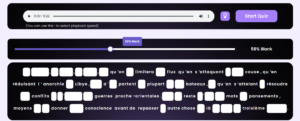Here’s how I use FrenchIRL.com to actually improve my French — even while working on the site itself.
Quick Guide, Jump to:
My Inspiration for the project
I created this project when I was really inspired. I was inspired thinking about my own Chinese journey. I was inspired by another project I had found for learning English. And I was inspired by watching my daughter start to say words in English. All of these were happening simultaneously and it produced the French in Real Life project.
For sure, It is still work for me to keep using it. I’m involved with the site daily. But that involvement is generally troubleshooting, writing blogs, or getting the site out to a wider audience. Though I work on the site daily, it’s usually behind-the-scenes — fixing bugs, writing posts, or reaching new users. Actually using the tools myself takes effort. But here’s how I make it work: I’ve found four key ways the project has helped me stay on track and actually use it to improve my French.
I want to share those with you and show how I make the most of practicing French with this site.
As I’ve said all across the site: I don’t believe any tool is a be-all-and-end-all solution to learning a language. I don’t believe I will become fluent simply by taking a class once a week, or using an app, or a regimen for self-study with reading, writing, & watching TV. The ultimate goal is to get out and speak and use the language. All of these tools in tandem will help unlock confidence to get me out there. That’s how I see this site as a contribution: it is a confidence boost in listening skills.
I see four areas to make the most of practicing with this site: the quiz itself, forming habits, the repetition, and the accent tool.

Let’s start with the most obvious: the quiz itself.
The daily quiz serves as a powerful reminder to practice. Every day, I know there is a new quiz to take. Just knowing that is a reminder that says “come back and take some practice”, a little bit each day goes a long way.
Each time I sit down to take the quiz I follow these steps.
I start with an easier level.
Move the slider to near 20% or so. This will give you a feel for the quiz without overwhelming. Remember, all the quizzes are out of context, even if you’re advanced, a lower percentage blank will help you get started. For me, even though I can definitely handle a greater challenge, I prefer this for my vocab and skills as a jumping off point.
Then I move to the higher levels,
gradually working up to 100%. This lets me make the most of each clip. Even practicing without a membership can provide 15 minutes of work for each daily quiz.
Like me, you’ll discover your confidence building.
While confidence grows in the current clip, I find I’m starting to recognize words and expressions. Especially the way a speaker uses their French.
This is the backbone of what I was hoping to achieve with the project in practice. I believe this is the same way a child learns a language. Children, even as babies, are surrounded by so much noise, and they eventually start recognizing words and equate it to meaning.
This project removes some of the context that babies benefit from. There is no pointing at objects nor any visual cues to help you. I expect that you are supplementing your French practice here with something else – vocab through another app, a teacher, or self-study some other way. My thought is that vocab only takes you so far. With the French in Real Life project, we put the vocab to use.
Out of context
That’s why I’ve come to love the challenge of using the quizzes out of context — because that’s exactly how language shows up in the real world. I may be biased, but I believe this is the best way to learn French with audio. In real life,
- You might be asked a question out of the blue,
- You might catch a snippet of an announcement in a crowded train station,
- You might hear something else in passing – on the Metro, in a store, on the street.
- It’s fast and unexpected, sometimes French is REALLY fast
All of this is language in real life, and it can be out of context. As native speakers, we don’t think anything of this. But in a second language, it is not so inherent.
I don’t try to follow along with full podcasts at this point, even on this site. I prefer to just throw myself in to the daily quiz, completely out of context.
You can absolutely make the most of full podcasts as a member of the site: browse all podcasts, choose a podcast in the dropdown filter, leave “any speed” selected and then sort “oldest first”
This will show you the first clip in an episode. Bookmark this page and start with the first episode. Inside each clip page, you’ll be able to click to the next clip after completion.
I encourage you to take on as much as you can in a day. But, please keep in mind sustained practice will be far more rewarding than a crash course!
For me, I prefer a little each day as items have a chance to soak in, I have to work to remember a word I heard a day before or in a previous clip. Slowly, I build up those skills and abilities over time, gradually.
For members with any account, your results are saved. This is a record of what you’ve done when and how long it took you. These results will continue to evolve as the project evolves. If you believe there are items we should track in addition to what’s included, please let us know your suggestions. hello@bitesizefrench.com
The Quizzes: TL;DR quick mini routine,
1 ) Start with 20% blank
2 ) Adjust difficulty gradually in 3-4 levels,
3 ) Ultimately try the quiz with 100% blank

Let’s talk about habits.
One of the ways I make practicing with the site truly rewarding is through the power of habit. This one surprised me, as I didn’t expect it to be a skill I’d develop. But it has been.
Consistency over the long run is far more effective than a deep dive today and only today. This isn’t rocket science and it’s certainly something I believed was important before I started this project,
However, what’s new is how this project has helped to create habits.
Here’s how habits can be set up and maintained on site:
One I already mentioned above. I love this project because I have the daily quiz. Every day there is a new quiz available, it’s random, it’s from a podcast or other audio on site, and it’s a powerful way to learn. Whether or not I visit the site, that daily quiz is still live, still available and a powerful tool for learning.
I also love the daily quiz because it let’s me dive in out of context. It is always something new each day. Those together help make it something that keeps me coming back to the site. Daily. There’s always practice available.
Make it real
Through this project, I’ve discovered the importance of making things real. I have a 15 minute calendar event on my calendar for practicing with the site.
I love this as it keeps it real. It is a friendly reminder. Of course, you could set your daily reminder to any type of practice, the important thing is it’s a commitment to practice. I share that with my wife and she checks in to make sure I’ve done it. The calendar and getting my family on board all serve as ways to make the habit real.
The flip side is there are times when you’ll miss a day. I don’t believe a habit dies, as Duolingo did in the icon (if you had Duolingo on your phone and weren’t practicing at the end of 2024, you’ll know what I’m talking about). Even if you miss a day, it doesn’t really matter. Just get back to it the next. Habits don’t break when we miss a day, they break when we feel guilty about them and give up. Keep the calendar appointment live, miss a day, just remember to restart the next. It’s not the streak that matters, it’s the practice.
This is new for me with this project. I have now put my French practice into the calendar and remind myself about it daily.
When you create it or how you create it really doesn’t matter. Are you going to do it in the morning? At lunch? A coffee break? Before sleep? Build it into your routine. Maybe it’s before you make your coffee in the morning. Or after you finish your lunch before returning to the office. If you build it into a spot in your day it’ll be easier to keep the practice alive.
I prefer mornings. I like the quiet stillness in the morning and it lets me really dive in to focus.
TL;DR, Quick Takeaways: Habit
Add practicing to your calendar to make it real
Share your practice goals with your SO, family, or friends.
Make it a part of your day.
Whether you use this site or any other skill, these above tools will help you make activities into a repeated habit. And speaking of repetition,

Use the Repeats in each quiz
Another item I love about the site is the automatic repetition. This is a great way to continue to hone your ear. While this is essential for me to complete the quizzes fully, I actually use this another way, too. Let me share,
I repeat out loud what I hear in the clip.
In learning a language, this type of repetition is called “mirroring”. While podcasts are scripted, there is a lot of natural intonation and natural word use in the script. It shows up in how the speaker is speaking. This makes it an ideal way to improve your own language use.
I do this regardless of the speaker’s gender. That said, in French, there is a lot of difference between genders, just listen to a podcast like episode 1 of Manger to compare how different the two hosts are from Simon.
Mirroring for improvement
Repeating and mirroring will help you improve your own use of French. It will help you sound more natural.
In my language learning journey, I consider my ears my greatest tool. Since a young age, I have also always loved accents. I believe that anyone can change their accents, it just requires really playing with my voice. When I consider it a musical instrument, it makes this possible. I play with my tongue, my mouth, my nose, where I make the sound come from in a range from deep in my throat to nearly my forehead. Using mirroring is a great way to practice this.
Focus on the sounds, not the words to mirror properly. It always helps to do this when no one is around, it will help you be fully uninhibited. I recommend long car rides or if you’re home alone. (Remember, a big part of mastering a language and getting the courage to speak it, is ultimately giving up how others might judge you as you progress to that point!) As you speak really play with your voice. Try to match the sound you produce with what you hear. Easier said than done, I know. But the difference will be noticeable.
Here in France I often get comments like “Where are you from? What part of France?” or I get complimented on my accent. I know I have this project to thank for those accents. It is from really internalizing the ways of speaking and the word use of the speakers on this project. Making that possible all comes from repetition!
TL;DR, quick routine for repetition
Take a deep breath, close the door, get alone
Turn up the volume and listen, really open your ears
Listen through twice without trying to figure out what’s said, just hear the sound.
Make the sound from your mouth match what you hear

Now let’s talk about Accent Marks
On my phone I don’t have to worry about accents. I’ve added a multilingual keyboard, which detects what I’m typing: English, French or Spanish and the autocorrect fills in the gap. This means I’ve been pretty lazy on Whatsapp and texting, accent marks and spelling are adjusted automatically.
On my computer it’s a different story. I still use a QWERTY keyboard, not the standard AZERTY keyboard of Francophone countries. This means many of the special or accented characters are hidden away or not easily added. In fact, I simply don’t know how to type them.
In the off chance that you too are on a QWERTY keyboard in a non-francophone region, I have added a tool to add accent marks in the quiz easily. Simply type a letter that can have special characters in French and options will appear. You can type a number of the accented option to add it directly into the quiz form.
My goal with this was to improve my spelling, speed up adding accents, and take the burden off learning HOW to type accents on my device. I hope these help you too. Here, there is still the opportunity to learn French, without having to learn HOW to type them on your device.
And, when I need to type an accent on my device (when writing an email, for instance), I use Google products. I’m biased, of course. I’ve found that Google’s spell check, whether in Gmail or in Google Docs, is superb at adjusting grammar and spelling. It adds accents automatically, and makes it easier for me to grammatically use French in writing. I, of course, still sound like an American. At least my accents are correct!
The accent tool is just that, a way to take the pressure off learning how to type the accents on your device and keeping the emphasis on actually using them in French. Try it in a quiz on site.

Beginners: What if I don’t understand anything yet?
Complete beginner? Fear not. We’ve got your back.
Originally this project was more geared towards intermediate learners. Now with the sliding scale for quiz levels, there is an opportunity for even the most introductory learners to develop their French listening skills.
I recommend using the lowest percentage if you are brand new to French. Listen and try to figure out the article or pronoun being used, then gradually level up.
I also encourage you to start with Balades podcast. Her speaking is neutral, steady paced, and content is still interesting. This makes French in the wild, French you might hear from a server speaking slowly at a restaurant, totally accessible. Read more of our ideas for audio for introductory learners here.
Discover all the content on site here: discover the right podcast for you at your level

What about you?
These are the ways that I have made the most of practicing with the site. I welcome you to steal from my ideas, make them your own, apply them to every area of your French practice, not just here on this site. I’m already applying them everywhere.
Let me know below, what works for you? What did I miss? Share your thoughts!
These strategies help me practice daily and build real-world French skills. Try them, tweak them, make them your own — and let me know what works for you! I’d love to hear your habits or tips below.








